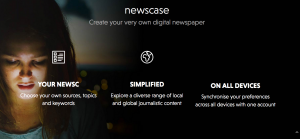- 49Shares
- Facebook16
- Twitter10
- LinkedIn20
- E-mail1
- Buffer2
 Located in an airy office in Berlin’s Mitte neighbourhood, newscase is a fast-growing, profitable Berlin journalism start-up – without any journalists.
Located in an airy office in Berlin’s Mitte neighbourhood, newscase is a fast-growing, profitable Berlin journalism start-up – without any journalists.
Newscase is an aggregator with a difference. It distributes the content of 100 partner publications by publishing entire articles. Readers can customise the news they receive, selecting up to 15 publications, as well as various themes, to download a personalised online newspaper.
The news app, which currently features German publications, is about to go global. It recently signed an agreement with Trinity Media Group to distribute 30 British publications, including the Guardian. It is also negotiating with publications in Brazil.
Personalised news
The idea of personalised news is not new. It is already possible to customise news choices on websites such as Google Alerts or Flipboard. However, while these direct users to the servers of the original publication, newscase publishes the entire articles on its domain. This means it’s also possible to download and read the articles when offline, (or even choose to have them read aloud in an expressive voice that mimics a news broadcaster through the app’s audio function).
“Our main target group, the so-called millennials, are commuting on a daily base, have very limited time for news consumption but have various interests and care especially for news diversity,” said Wanja Oberhof, who co-founded the app in 2012. “Newscase is made for them because it allows users to create their own personal and digital newspaper and read it wherever they are, no matter if they are online or not.”
“Our editorial credibility comes from the partners with whom we work,” said Stephan von Wrede, sales manager and one of eight staff in newscase’s office. Newscase is currently available on smartphones and tablets, Android and Apple (Apple i-phone users are 10 times more likely to pay for apps, according to von Wrede).
Like fellow journalism distributor, Blendle, where readers pay per individual article, newscase charges a fee. Premium users, who have access to all online news content, including content normally behind a paywall, pay 9.99 euros per month for a premium subscription.
The company puts their subscriber revenue in a pool, which they divide between the publications based on the amount of articles which are read. “They earn money when we earn money,” said von Wrede. “They don’t get money in advance, but they get paid when we are paid.”
The company (which recently changed its name from Niiu) also employs a staff of 10 developers in Goa, India, and an office in New York, where the start-up is part of a six-month German Accelerator program.
Local Newspapers
International expansion is a logical next step for newscase, according to von Wrede. Germany, where 95% of all press is local, is an unusually difficult market.
“I don’t think there’s any other country in the world where you have so many local newspapers,” von Wrede said, explaining that most regions have their own devoted local paper. “If you go to Brazil, you only have to talk to eight publishers and you have covered the entire country, but in Germany you have to talk to 80.”
The de-centralisation of news in Germany also means it is hard to attract national attention for apps such as newscase. “If you launch a product in Berlin, you will not be automatically secure that people in Munich will take notice of that,” he said. “That is easier in the UK, where you only have to be in four or five cities, including London.”
Yet while paid online news content is now a time-tested phenomenon in many parts of the world, like the US, it’s still an experiment in Germany, according to von Wrede. “Who knows where this paid content train will go?” he said.
- 49Shares
- Facebook16
- Twitter10
- LinkedIn20
- E-mail1
- Buffer2
Tags: Digital Media, digital news, German Media, Internet, Journalism, media, Media economics, New media, New technology, Online journalism












































